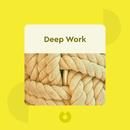Deep Work
Deep Work: Rules for Focused Success in a Distracted World
Your highlights:Multitasking and distraction are the enemies of productivity.
Despite this data, workers feel like they’re working more than ever. That’s because completing small tasks and moving information around makes us feel busy and accomplished – but it’s actually just preventing us from truly focusing
10 June, 2019 05:20 Share
She demonstrates that when switching from task A to task B, our attention stays attached to the first activity, which means we can only half-focus on the second, which hurts our performance. Her experiments utilized two groups: group A worked on word puzzles until she interrupted them to go on to reading resumes and making hypothetical hiring decisions; Group B got to finish their puzzles before moving on to the resumes. In between the two tasks, Leroy would give a quick test to see how many keywords from the puzzles were still stuck in the participants’ minds. The result? Group A was much more focused on the puzzle and therefore less focused on the important task of hiring the right person. The long and short of it? Multitasking is no good for productivity. Neither is being electronically connected all the time. In fact, while it might seem harmless to keep social media and email tabs open in your web browser, the mere fact of seeing things pop up on your screen is enough to derail your focus, even if you’re not immediately addressing notifications.
10 June, 2019 05:36 Share
Focus your brain and be selective about your use of technology.
productive meditation can rewire your brain and help you focus. Here’s how it works: Use moments that would otherwise be unproductive – like walking your dog, taking a shower or commuting to work – to consider a problem you need to take care of without letting your mind change subjects. To get started, ask yourself questions that identify different issues in solving a given problem. Then, once you’ve landed a specific target, ask yourself action questions like, "What do I need to accomplish my goal?" Think of it as a hardcore workout routine for your brain that will help build your focus!
10 June, 2019 05:43 Share
Scheduling both work and free time is essential to restoring energy.
By scheduling everything you do, you’ll free up time for being mindful of how you spend it. At the start of every workday, create a schedule that’s divided into blocks of at least 30 minutes. In this schedule you should set both work and personal tasks like time to relax, eat or catch up on email. It’s inevitable that your schedule will change during the day, but if this happens, just rearrange your blocks. The idea isn’t to strictly abide by your itinerary, but to cultivate awareness about how you spend your time.
10 June, 2019 05:45 Share
About the book:
Deep Work (2016) is all about how the rise of technology has wrecked our ability to concentrate deeply on tasks – and how to overcome this blockade. These blinks illustrate different strategies that can help you improve the output of your work and get the most out of your free time.
About the author:
Cal Newport is an assistant professor of computer science at Georgetown University specializing in the theory of distributed algorithms. Several publications, including Inc. Magazine, The Globe and Mail and 800-CEO-Read, have featured his most recent book, So Good They Can’t Ignore You, on their lists for the best business book of the year.
Blinkist takes outstanding nonfiction books and distills their key insights into made-for-mobile book summaries that you can read in just 15 minutes. Learn something new every day - on your smartphone, tablet or PC.
blinkist.com